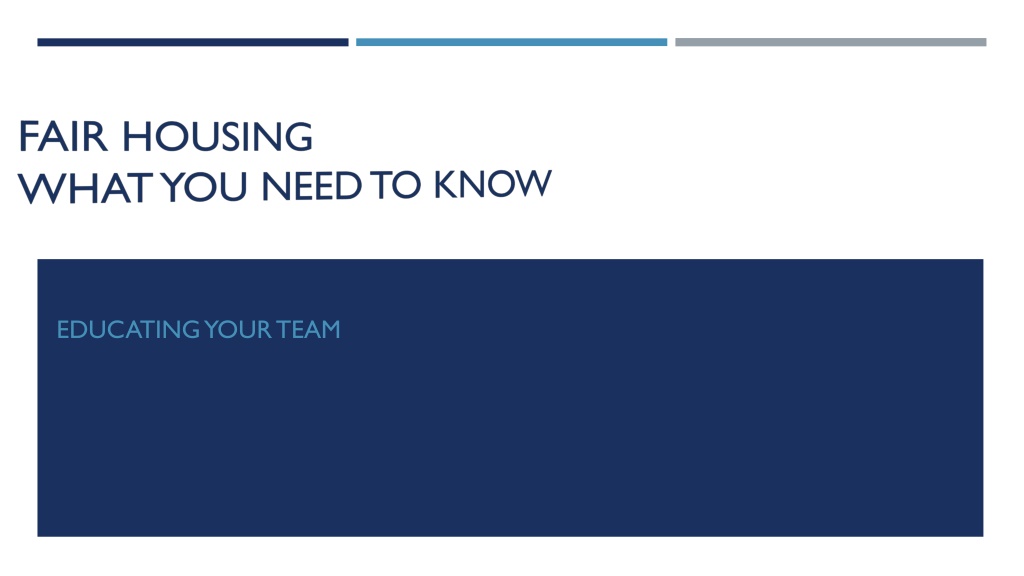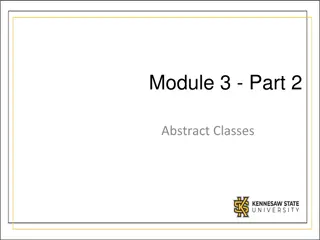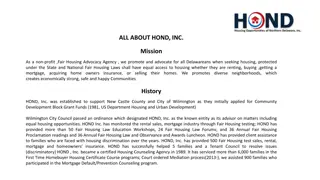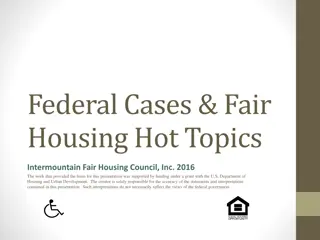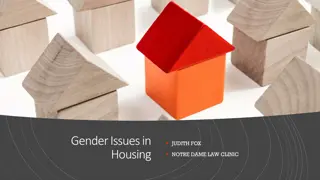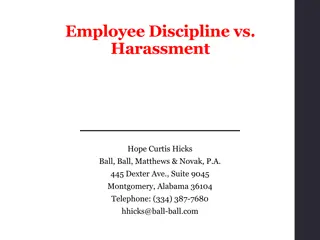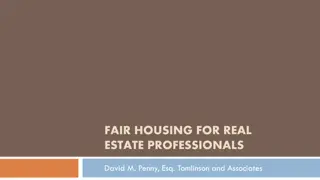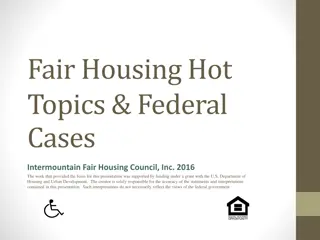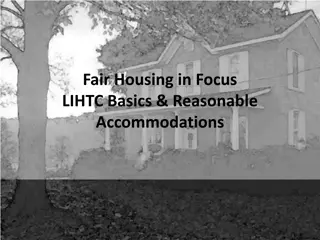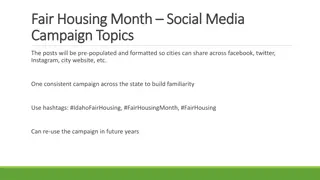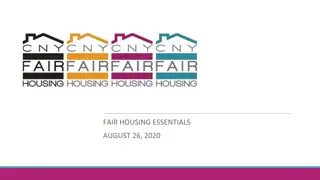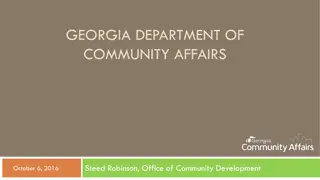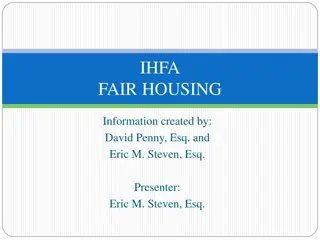Understanding Protected Classes and Fair Housing Laws in the Workplace
Learn about the federal 7 protected classes, state and local protected classes, and key guidelines for leasing staff to ensure fair housing compliance. Understand what constitutes familial status, national origin, and disability. Educate your team on Grace Hill Fair Housing training and ensure adherence to fair housing laws to create an inclusive work environment.
Uploaded on Nov 12, 2024 | 0 Views
Download Presentation

Please find below an Image/Link to download the presentation.
The content on the website is provided AS IS for your information and personal use only. It may not be sold, licensed, or shared on other websites without obtaining consent from the author. Download presentation by click this link. If you encounter any issues during the download, it is possible that the publisher has removed the file from their server.
E N D
Presentation Transcript
WHAT ARE THE FEDERAL 7 PROTECTED CLASSES Race, Color, Religion, Sex, Handicap, Familial Status, National Origin. FAMILIAL STATUS One or more individuals, who have not attained the age of 18, permanently with a parent or another person having legal custody of individuals. Any person who is pregnant or is in the process of securing legal custody of any individual(s) who have not attained the age of 18. NATIONAL ORIGIN Discriminate against people because they are from a particular country or part of the world, because of ethnicity or accent, or appear to be of a certain ethnic background but are not.
STATE AND LOCAL PROTECTED CLASSES You should look up and verify if your State and or locality has additional protected classes. Ohio-Ancestry and Military Status are protected. Indiana-Same as Federal Missouri-Same as Federal Texas-Same as Federal Austin has additional protections marital status, sexual orientation, gender identity, age and status as a student. Louisiana-Same as Federal New Orleans has additional protections, marital status, sexual orientation, gender identity.
LEASING DOS Be Consistent throughout the day! All leasing staff should know what the qualifications are to lease at your community. Know the availability and specials, everyday. Use guest cards for every piece of traffic. Document on guest card the details that were offered. Quote a specific unit and special , let the prospect know this is what s available at this time. Ask total occupants, never who. (Hud properties exception) No steering or segregating (in anyway) Cameras are placed to protect the property not residents or their personal property. Don t answer a question if you don t know the answer. Everyone regardless of qualifications can complete an application. You should tour everyone the same. It is up to the prospect to give you any limitations they may have.
EDUCATING YOUR TEAM All employees not just the office should do the Grace Hill Fair Housing training course. Ask a fair housing question at every employee meeting. Make it fun! All properties should have Fair Housing statement posted and visible. Every leasing office should have this signage in leasing area. Advertising should include a fair housing logo. (HUD signage and advertising logo is required for HUD properties) All shapes and sizes can be found at: www.hud.gov and search fair housing logo.
WHAT IS A DISABILITY? There are both physical and mental disabilities. Included but not limited to: Diseases and conditions as orthopedic, visual, speech, and hearing impairments, cerebral palsy, autism, epilepsy, muscular dystrophy, multiple sclerosis, cancer, heart disease, diabetes, viral infection, mental retardation, emotional illness, drug addiction. Individual with a physical or mental impairment that substantially limits one or more major life activities. Major life activity includes, but isn t limited to, caring for oneself, performing manual tasks, walking, seeing, hearing, learning and working. Individuals who are regarded as having such an impairment. Individuals with a record of such an impairment.
WHAT YOU SHOULD KNOW ABOUT DISABILITY People with a disability are not required to disclose they have a disability to a housing provider and you should never ask if they have a disability unless one of the following apply. (Exceptions would be language that is included in the criteria for eligibility or the person is trying to qualify for a specific deduction against income, HUD) or Resident has requested a reasonable accommodation or modification and then the questions is are you disabled . Other than for reasons listed above you can not ask if someone has a disability. Never ask how they qualify as disabled. (No exception on this one)
WHAT SHOULD I SAY WHEN If a prospect asked any questions regarding reasonable accommodations our answer is .. We comply with Federal Fair Housing guidelines If a current resident asked why a resident has a pet that doesn t meet our pet policy requirements our answer is .. We comply with Federal Fair Housing guidelines
REASONABLE ACCOMMODATIONS A Reasonable Accommodation is making a change in a Rule, Policy, Practice, Procedure or Service. Reasonable accommodations are usually at a minimum or no cost that we will cover for the resident as a courtesy. Such as in most cases this is installing a grab bar, a handicap accessible sign, service animal, etc. It is best practice to handle accommodation and or modifications in written form (Resident Reasonable Accommodation Request form). Policy and forms can be found on your property website address/files. Although we provide forms for request, a request can be made orally or in writing. If someone rejects the use of form provided you should take notes, accept letter, and then contact PMT for more direction. Reasonable accommodations should be processed promptly, timely, and in a justified time frame. If the individual requesting a reasonable accommodation has a disability that is obvious and if the need for the requested accommodation is obvious, the person receiving the reasonable accommodation request may not need to request any additional information like proof of disability.
WHAT DO I NEED WHEN A RESIDENT MAKES A REQUEST? For any and all types of Accommodations or Modifications: Resident needs to complete Resident s Reasonable Accommodation Request Form For Service/Assistance Animals: Resident s Reasonable Accommodation Request Form Service/Assistance Animal Policy-Review the documentation they will need on 2. A&B Request for Approval of Assistance/Service Animal Occupancy Once you provide the forms and information to resident, it s up to them to return all required information. DOCUMENT, DOCUMENT, DOCUMENT! Put copies of notices pertaining to animals and all documents you gave resident and date/time stamp them in FILE Once all documents are received back you should scan and email PMT for review.
TYPES OF ACCOMMODATIONS Reasonable Accommodation Reasonable Modification Examples: Examples: Assistance animal Grab Bar Pay rent on the 5th Install a ramp Transfer from upper floor to 1stfloor Widening a doorway Install a handicap parking sign Add a strobe fire detector Change a light bulb Pathway repair Ask that no one enters apt on Wednesdays Change hardware on doors
MEDICAL MARIJUANA? Is medical marijuana a reasonable accommodation? Despite changes in many state and local laws, the manufacture, distribution, or possession of marijuana remains a federal criminal offense. The U.S. Dept. of Housing and Urban Development has distributed a memorandum that states the use of marijuana for medical purposes violates federal law and that federal and state anti-discrimination laws do not require leasing offices to accommodate requests by current or prospective residents with disabilities to use medical marijuana. Specifically, HUD concluded that management may prohibit the use of medical marijuana as a reasonable accommodation because: (a) persons who are currently using illegal drugs (which include medical marijuana) are disqualified from protection under the definition of disability in the law; and (b) such a proposed accommodation is not reasonable under the FHA because it would constitute a fundamental alteration in the nature of the operations.
REASONABLE MODIFICATION A reasonable modification is a structural change made to existing premises, for the disabled. You should notify PMT prior to approval or denial of request. This would include a ramp, widening a door way, changing a toilet, tub, installing a flashing smoke detector, lowering cabinets, etc. Who pays? Let s discuss in a moment. Landlord has to approve the modification. Landlord has the right to approve the contractor. Landlord can require an escrow account in order to undo changes when resident vacates premise. It is best practice to handle accommodation and or modifications in written form (Resident Reasonable Accommodation Request form).
WHAT DO WE NEED FOR A REASONABLE ACCOMMODATION OR MODIFICATION? Once a resident asked for a reasonable accommodation, we should request the resident to complete a Reasonable Accommodation Request form. and provide reliable disability related information that included in form 1-3. 1) verify that the person meets the Act s definition of disability and request is necessary. 2) describe the needed modification. 3) show the relationship between the person s disability and the need for the requested accommodation or modification. It is best practice to handle accommodation and or modifications in written form. Submit to PMT for approval
WHO PAYS FOR MODIFICATIONS? Resident pays for modification to any building built prior to March 13, 1991. Owner is responsible for constructing any multi-family building built after March 13, 1991, in compliance with the seven design requirements. Subsidized Only Unless it is an undue admin or financial burden. Best practice: meet to discuss other alternatives. Accessible bldg entrance on accessible route. Accessible and usable public & common use facilities. Usable doors by persons in wheelchairs Accessible route into and through the covered unit. Light switches, electrical outlets, thermostats and other environmental controls in accessible locations. Reinforced walls for grab bars. Usable kitchens and bathrooms. 1. 2. 3. 4. 5. 6. 7.
WHAT IS THE DIFFERENCE BETWEEN A SERVICE ANIMAL AND ASSISTANCE ANIMAL Service/Assistance not much difference, these animals are not considered to be pets. This is why a pet policy, deposit, monthly pet rent, fees, breed, size, or type of animal do not apply to our standard pet policy. A service animal is defined as a dog that has been trained to do work or perform tasks for an individual with a disability. Service animals are not required to wear identifying equipment or to be certified or licensed unless there is a local ordinance that requires all dogs be registered. An assistance animal (companion or emotional support animal) is not limited to a dog. Used for emotional support, therapy, comfort, or companion. A companion animal (assistance animal) are not usually trained and considered emotional or companion support animals. Both Service and Assistance animals are permitted in all common areas including pool deck, but are not allowed in the pool or spa. There are no limits on how many service/companion animals one can have, animal just needs to be prescribed with a purpose for each animal. You should follow your local ordnances on registration or limitations on how many animals. If you have any questions, ask PMT for help to determine if it s a reasonable accommodation.
WHAT AND WHO CAN PROVIDE DOCUMENTATION Everyone seems to have an assistance animal? Do we have to accept suspect online ESA s (Emotional Support Animal)? No, we have the right to request supplemental credible confirmation of (an) underlying disability, meaning we can establish the legitimacy of the requesting party s disability status as defined by fair housing law. We can do this by requiring additional information to authenticate all or some of the information provided to help us evaluate their reliability and knowledge of the requester s disability by asking them To provide the location of where the care is/was provided or the duration of the care, and/or the number of in-person sessions they have had with the verifying party within the preceding year. Is the verifier trained in any field or specialty related to persons with disabilities or the particular impairment cited or recognized by consumers, peers, or public as a credible provider of therapeutic care? This information can often be provided by the individual who is requesting the accommodation, such as by submitting proof that the individual receives disability benefits. Or can be verified by a doctor or other medical professional, a peer support group, a non-medical service agency, or a reliable third party who is in a position to know about the individual s disability. Although you can request proof that a resident is disabled and that the accommodation assists the person with that disability, we still do not want and cannot require them to provide the nature or severity of the disability.
SERVICE/ASSISTANCE ANIMAL BEHAVIOR The resident/handler is responsible for the care of his/her animal. The animal must be supervised and they must retain full control of the animal at all times while in common areas. Behavior issues: Dog rears up on back legs, lunges, bared teeth, barks excessively at people other animals. The resident/handler is also responsible for proper clean up and should always carry equipment necessary to do so. If they are not able to pick up after animal, they must make arrangements for such help. Resident is responsible for any damages caused by service/companion animal. If there is a behavior issue with the service/companion animal reach out to PMT prior to addressing the issue for instruction.
HOARDING Is hoarding a disability?? YES!!! It is considered a mental disability. How do you know if it s hoarding? It s determined on an individual basis, but if you had a OMG moment and anyone looking at a pictures would too, it s most likely hoarding. Can we just non-renew??? No, unless there s another reason other than hoarding or housekeeping or it could be considered retaliation. What does this mean? We may need to make reasonable accommodations.
BEST PRACTICES o Don t confuse housekeeping issue with hoarding. o Communication between maintenance and office, we should know when housekeeping is getting out of hand. o Inspections-Between pest control and annual inspections it should not reach a level of hoarding. o Communicate via phone with PM if there is a question regarding this matter.
VAWA VIOLENCE AGAINST WOMEN ACT LAW AND BEST PRACTICES
VAWA-VIOLENCE AGAINST WOMEN ACT Protects how victims of past or ongoing domestic violence, dating violence, or stalking for those women who live in public housing authorities or Section 8 HUD Programs. What does this mean to the market properties? It means we are not bound to the VAWA guidelines set by HUD, however we need to be prepared to handle this type of situation. You need to find out if your State or City has a defined law regarding domestic violence, dating, or stalking. Texas is the only one I found any information on.
RTA/AMH VAWA VAWA Forms Resident receives HUD forms 5380 and 5382 at HUD-5380 Notice of Occupancy Rights Move in HUD-5381 Model Emergency Transfer Plan AR HUD-5382 Certification of Domestic Violence Renewal HUD-8383 Emergency Transfer Request With initial notice for Eviction and or Termination for each action of occurance. HUD-91067 VAWA Lease Addendum Create an Emergency Transfer Plan- And must be able to live by it.
VAWA-VIOLENCE AGAINST WOMEN ACT You should not: Refuse to rent to an applicant solely because the applicant is, or has been a victim of domestic violence, dating violence or stalking. 1. Evict a resident who is the victim of domestic violence, dating violence, or stalking because of threats or violent acts committed against the victim-even if they took place on the property, and even if they were inflicted by a household member or a guest. 2. Hold a resident who is a victim of domestic violence, dating violence, or stalking to a higher standard than other residents in any way (noise, damage to the unit, etc.) 3.
VAWA-VIOLENCE AGAINST WOMEN ACT Exception to evict 1. The violence poses and actual or immediate threat to other residents or employees if the victim is not evicted. (Very grey area) 2. The resident has violated the lease in a way that is not related to domestic violence, and you would evict any other resident who committed the same violation.
BEST PRACTICES WHEN REPORTED 1. You can ask for certification that the person is a victim of violence. This request should be made in writing and give victim at least 14 days to gather documentation in public housing. There is a 6 month window to report. 2. Confidentiality- Do not discuss with anyone, need to know basis with staff. HUD property must keep a separate file for report and store in secured area separate from resident file. 3. Resident must give written notice, in which they state the plan to terminate lease, minimum 30 day notice. Resident is not required to stay in the unit. 4. Resident needs to completely vacate apartment on the date indicated, return keys, and remove all belongings. 5. Resident is still liable to pay all balances currently owed including damages up to and including the 30 day notice period only. If abuser is also on lease, the abused will only need to provide protection order or other documentation to be released. In order to protect both resident and property, VAWA gives the ability to split a lease in order to evict an abuser from a household in public housing
Which of the following are part of the 7 federal protected classes? A. Age B. Sex C. Both
Once a resident/prospect says they will need to have an assistance animal, what is the correct question you can ask to determine if an accommodation is needed? A. What is your handicap? B. Are you disabled? C. How do you qualify as handicap? D. Both B and C B. ARE YOU DISABLED
Ashley greeted a prospect who entered in a wheel chair. The prospect asked to see a two bedroom apartment. The only two bedroom Ashley has available is located on the 3rd floor. What should Ashley do? A. Tell the prospect we don t currently have a two bedroom available? B. Offer to show prospect a one bedroom on first floor? C. Tell prospect yes we have a two bedroom available? C. Everything exactly the way you would for anyone else. Tell prospect it s located on the 3rd floor right next to the BBQ grills with a pool view that I can show you and make motion to do so. It s up to the prospect to be specific on their needs and limits.
A resident comes into to the office and says he needs a special type of tub installed. Your property was built prior to 1991. Who should pay for the modification? A. THE RESIDENT B. THE PROPERTY C. THE COST SHOULD BE SPLIT A. THE RESIDENT
A resident requests that we allow her to pay rent on the 5th without late fees because her payment from disability doesn t get direct deposited until the 4th of the month. What do we tell her? A. Unfortunately our policy is rent is late after the 3rd so you will be assessed late fees? B. Have her complete the reasonable accommodation form and submit proof of direct deposit? C. Ask resident if she is disabled? B. This is a reasonable accommodation and we confirm she s disabled once she submits proof of direct deposit from the social security disability on bank statement showing the 4th or info should be in file used for proof of income.
A prospect tells you they have a companion animal that is a pit bull breed and asked if thats ok? What should you say? A. We comply with Federal Fair Housing guidelines. B. You can review our service/assistance animal policy, provide a reasonable accommodation request form and then complete the service/assistance animal application. C. Pit bulls are a restricted breed and not allowed. A. With this being a prospect it s best to stick to basics of we comply with federal fair housing guidelines .
